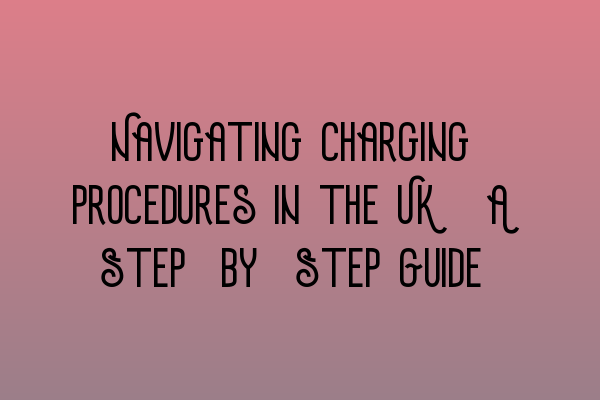Navigating Charging Procedures in the UK: A Step-by-Step Guide
Welcome to the SQE Criminal Law & Practice Law UK blog! If you find yourself wondering about the process of navigating charging procedures in the UK, you’ve come to the right place. Understanding these procedures is crucial for anyone involved in criminal law, whether you are a solicitor, law student, or just interested in the legal system.
Before delving into the step-by-step guide, let’s briefly touch upon the importance of staying up-to-date with the evolving legal landscape. One way to ensure you stay informed is by regularly practicing with SQE 1 Practice Exam Questions. These practice questions will help you test your knowledge and identify areas that need improvement.
Step 1: Arrest
The first step in the charging procedure journey starts with an arrest. When a person is arrested, it means they are taken into custody by the police. It’s crucial to remember that an arrest does not imply guilt. The police have the power to arrest a person based on reasonable suspicion of their involvement in a criminal offense.
To prepare for this stage, law students can benefit from SQE 1 Practice Mocks FLK1 FLK2. These mock exams simulate real-world scenarios and provide invaluable practice for the SQE 1 exam.
Step 2: Detention
After the arrest, the suspect is typically detained at a police station for further investigation. During this stage, the police gather evidence, interview the suspect, and assess the viability of charging the individual with a crime. It’s important to note that a person can only be detained for a reasonable period, as stipulated by law.
Step 3: Charge or Release
Following the detention stage, the police will decide whether to charge the individual with a crime or release them without any charges. If the decision is to proceed with the charges, the police will present their case to the Crown Prosecution Service (CPS). The CPS will carefully evaluate the evidence and determine if there is a realistic prospect of conviction.
To gain a comprehensive understanding of the charging process, it’s highly recommended to enroll in SQE 1 Preparation Courses. These courses cover all necessary topics and provide rigorous training to equip you with the knowledge needed to excel in the SQE 1 exam.
Step 4: Prosecution Decision
Based on the evidence presented by the police, the Crown Prosecution Service evaluates whether the case should proceed to court. They consider factors such as the strength of evidence, public interest, and the Code for Crown Prosecutors. If the decision is made to prosecute, the CPS will initiate the legal proceedings against the accused.
Step 5: Court Proceedings
The case will then proceed to court, where the defendant will face trial. It’s important to note that the defendant is presumed innocent until proven guilty. The court will hear the evidence, examine witnesses, and consider legal arguments from both the prosecution and the defense. Ultimately, the court will make a judgment and deliver a verdict.
For those preparing for SQE 2, don’t forget to explore the SQE 2 Preparation Courses we offer. These courses are designed to enhance your understanding of criminal law and prepare you for the challenges of the SQE 2 exam.
By now, you should have a solid understanding of the step-by-step process involved in navigating charging procedures in the UK. Remember, staying informed about legal developments and practicing with SQE exam questions are essential for success in the field of criminal law.
If you’re interested in finding out more about upcoming SRA SQE Exam Dates, be sure to check out our related article for a comprehensive list.
Thank you for reading, and we hope this guide has been informative for you. If you have any further questions or would like to learn more, feel free to contact us. Happy navigating!
